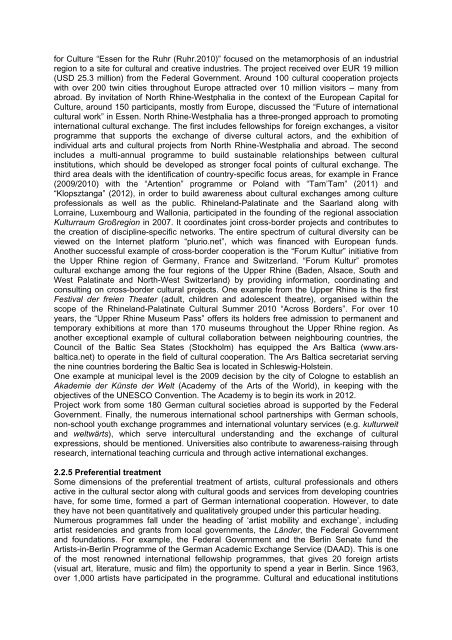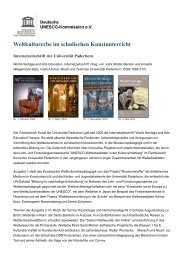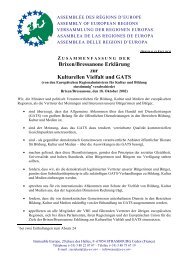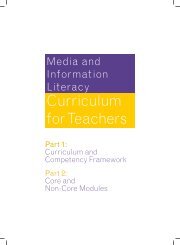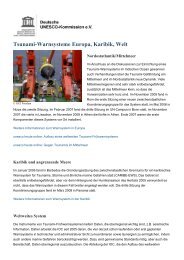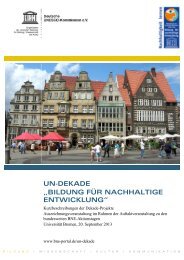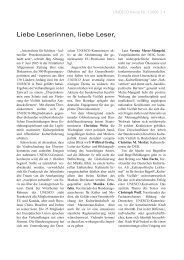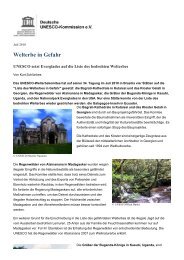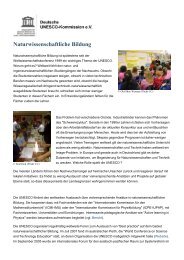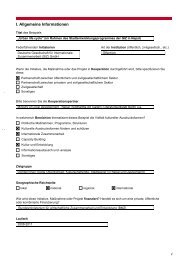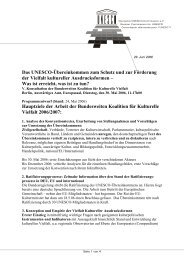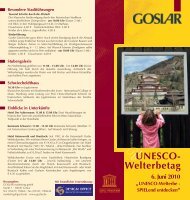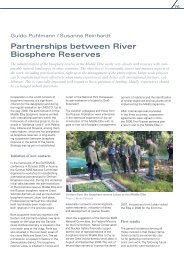Annex Form - Deutsche UNESCO-Kommission
Annex Form - Deutsche UNESCO-Kommission
Annex Form - Deutsche UNESCO-Kommission
Create successful ePaper yourself
Turn your PDF publications into a flip-book with our unique Google optimized e-Paper software.
for Culture “Essen for the Ruhr (Ruhr.2010)” focused on the metamorphosis of an industrial<br />
region to a site for cultural and creative industries. The project received over EUR 19 million<br />
(USD 25.3 million) from the Federal Government. Around 100 cultural cooperation projects<br />
with over 200 twin cities throughout Europe attracted over 10 million visitors – many from<br />
abroad. By invitation of North Rhine-Westphalia in the context of the European Capital for<br />
Culture, around 150 participants, mostly from Europe, discussed the “Future of international<br />
cultural work” in Essen. North Rhine-Westphalia has a three-pronged approach to promoting<br />
international cultural exchange. The first includes fellowships for foreign exchanges, a visitor<br />
programme that supports the exchange of diverse cultural actors, and the exhibition of<br />
individual arts and cultural projects from North Rhine-Westphalia and abroad. The second<br />
includes a multi-annual programme to build sustainable relationships between cultural<br />
institutions, which should be developed as stronger focal points of cultural exchange. The<br />
third area deals with the identification of country-specific focus areas, for example in France<br />
(2009/2010) with the “Artention” programme or Poland with “Tam’Tam” (2011) and<br />
“Klopsztanga” (2012), in order to build awareness about cultural exchanges among culture<br />
professionals as well as the public. Rhineland-Palatinate and the Saarland along with<br />
Lorraine, Luxembourg and Wallonia, participated in the founding of the regional association<br />
Kulturraum Großregion in 2007. It coordinates joint cross-border projects and contributes to<br />
the creation of discipline-specific networks. The entire spectrum of cultural diversity can be<br />
viewed on the Internet platform “plurio.net”, which was financed with European funds.<br />
Another successful example of cross-border cooperation is the “Forum Kultur” initiative from<br />
the Upper Rhine region of Germany, France and Switzerland. “Forum Kultur” promotes<br />
cultural exchange among the four regions of the Upper Rhine (Baden, Alsace, South and<br />
West Palatinate and North-West Switzerland) by providing information, coordinating and<br />
consulting on cross-border cultural projects. One example from the Upper Rhine is the first<br />
Festival der freien Theater (adult, children and adolescent theatre), organised within the<br />
scope of the Rhineland-Palatinate Cultural Summer 2010 “Across Borders”. For over 10<br />
years, the “Upper Rhine Museum Pass” offers its holders free admission to permanent and<br />
temporary exhibitions at more than 170 museums throughout the Upper Rhine region. As<br />
another exceptional example of cultural collaboration between neighbouring countries, the<br />
Council of the Baltic Sea States (Stockholm) has equipped the Ars Baltica (www.arsbaltica.net)<br />
to operate in the field of cultural cooperation. The Ars Baltica secretariat serving<br />
the nine countries bordering the Baltic Sea is located in Schleswig-Holstein.<br />
One example at municipal level is the 2009 decision by the city of Cologne to establish an<br />
Akademie der Künste der Welt (Academy of the Arts of the World), in keeping with the<br />
objectives of the <strong>UNESCO</strong> Convention. The Academy is to begin its work in 2012.<br />
Project work from some 180 German cultural societies abroad is supported by the Federal<br />
Government. Finally, the numerous international school partnerships with German schools,<br />
non-school youth exchange programmes and international voluntary services (e.g. kulturweit<br />
and weltwärts), which serve intercultural understanding and the exchange of cultural<br />
expressions, should be mentioned. Universities also contribute to awareness-raising through<br />
research, international teaching curricula and through active international exchanges.<br />
2.2.5 Preferential treatment<br />
Some dimensions of the preferential treatment of artists, cultural professionals and others<br />
active in the cultural sector along with cultural goods and services from developing countries<br />
have, for some time, formed a part of German international cooperation. However, to date<br />
they have not been quantitatively and qualitatively grouped under this particular heading.<br />
Numerous programmes fall under the heading of ‘artist mobility and exchange’, including<br />
artist residencies and grants from local governments, the Länder, the Federal Government<br />
and foundations. For example, the Federal Government and the Berlin Senate fund the<br />
Artists-in-Berlin Programme of the German Academic Exchange Service (DAAD). This is one<br />
of the most renowned international fellowship programmes, that gives 20 foreign artists<br />
(visual art, literature, music and film) the opportunity to spend a year in Berlin. Since 1963,<br />
over 1,000 artists have participated in the programme. Cultural and educational institutions


